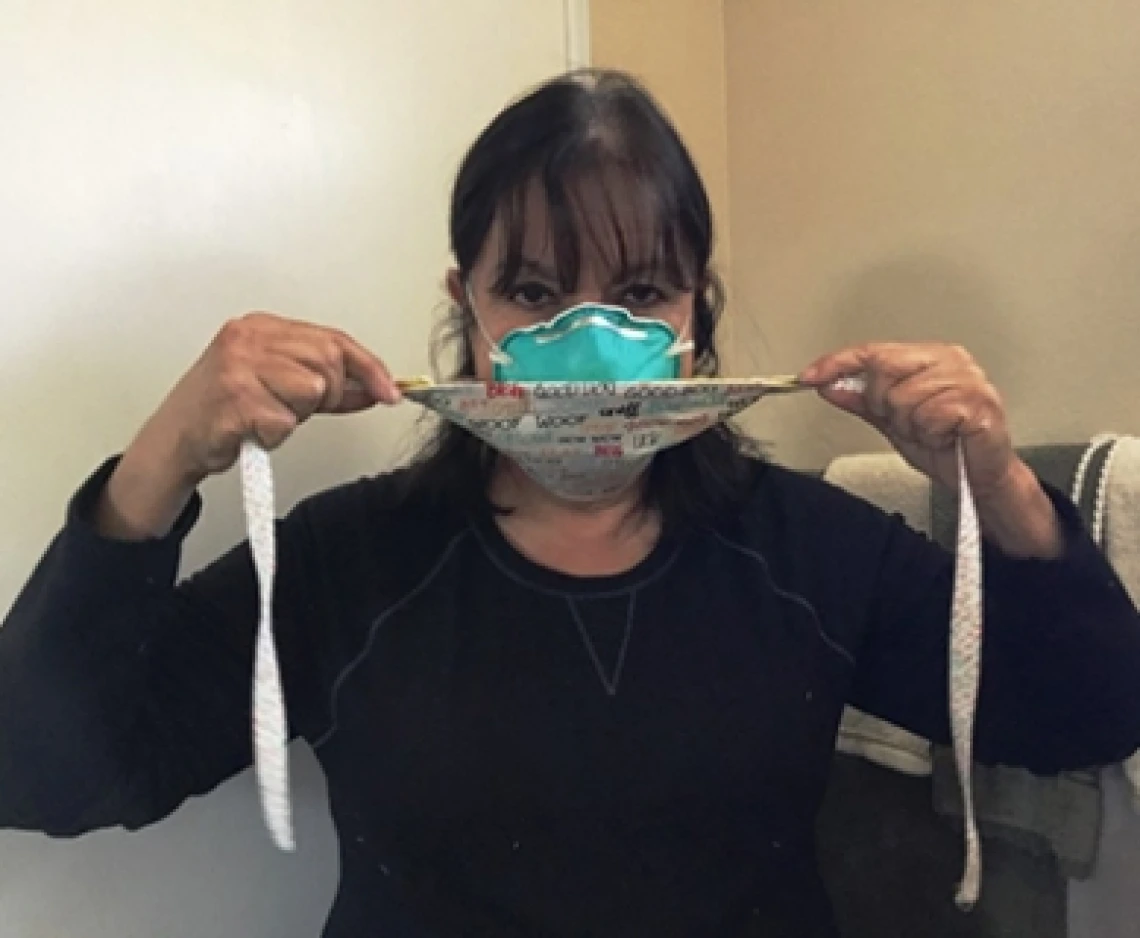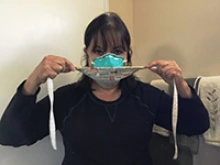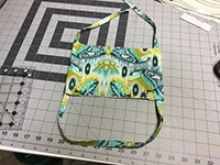UArizona Nursing Volunteers Create Guide for Homemade Face Masks to Address Shortage in Response to COVID-19 Pandemic
Community-minded University of Arizona faculty and staff members are aiding an effort to address the face mask shortage that has challenged health care workers across the country because of high demand for personal protective equipment.

TUCSON, Ariz. – Doing their part to help out during the current COVID-19 pandemic crisis, community-minded University of Arizona College of Nursing Tucson faculty and staff members are aiding in the effort to address the face mask shortage that has challenged health-care workers across the country.

A model demonstrates the proper use of a homemade face mask in tandem with an N95 respirator mask.
Three members of the Steele Innovative Learning Center, Yvette Mathesen MEd, BSN, RN; Paige Bravo BSN, RN, CCRN; and Terry Bailey, BSN, RN, have developed a homemade face mask pattern with assistance from Yvonne Flores and Diane Arnold, two members of the Corpus Christi Quilting Ministry. Their work has resulted in hundreds of masks being distributed as close to home as Banner – University Medical Center and as far away as North Carolina.
The U.S. Centers for Disease Control and Prevention guidelines state that health-care providers should use homemade masks, such as scarves and bandanas, for care of patients with COVID-19 only as a last resort because their capability to protect providers is unknown. The CDC urges caution when considering these options and stresses they ideally should be used in combination with a face shield that covers the entire front (extending to the chin or below) as well as sides of the face.
Working within these guidelines, and using feedback from local nurses, Bravo and Mathesen, along with their quilting collaborators from the Corpus Christi Quilting Ministry, diligently worked on a fabric-based tie design. The current design does not have elastic around the ears, a common feature in many do-it-yourself videos circulating. This is beneficial because it will not break down with repeated use and cleaning, is completely adjustable and can cover the N95 mask.

A completed face mask, designed by UArizona Nursing staff. See link for detailed instructions on how sewing circles can recreate them.
“We are all in this together and it’s heartwarming to see our nurses working with community members to sew these for health-care workers who may be facing shortages amid this pandemic,” said Connie Miller, DNP, RNC-OB, CNE, CCCE, chair, Division of General Nursing and Health Education.
These alternative face masks are not meant to supply full protection from COVID-19. Rather, they serve only to augment protection for health- care professionals offered by an N95 filtering face piece respirator mask or to extend the re-use of N95 masks under crisis conditions.
For step-by-step face mask instructions, please visit this link.
Individuals with sewing skills who wish to join in the effort can contact Arnold at FaceMasksTucson@gmail.com in Tucson to get pre-cut fabric masks they can sew. They also can contact Flores FabricfacemasksTucson@gmail.com with questions about the pattern.
Quilt Basket (6538 E. Tanque Verde Road, Ste. 130, Tucson, AZ 85715) in Tucson is handing out the UArizona Nursing-designed kits -- or 1 yard of free fabric – allowing volunteers to make masks and drop them off when completed. Calling (or texting) ahead is recommended: 520-722-8810.
More information on the college’s activities regarding the COVID-19 pandemic are at this link.
The UArizona Health Sciences COVID-19 Resources webpage can be found here.
For the latest on the UArizona response to the novel coronavirus, please visit the university's COVID-19 webpage.
# # #
NOTE: Photos available upon request.
About the University of Arizona College of Nursing
Established in 1957, the University of Arizona College of Nursing has been transforming nursing education, research and practice to help people build better futures for more than 60 years. Consistently ranked among the best programs in the nation, the college is strengthening health care’s largest workforce and the public’s most trusted profession through its undergraduate and graduate programs, offered online and on-campus in Tucson and Phoenix. Headquartered in Tucson, Ariz., where integrative health has been pioneered, the UA College of Nursing is home to the world’s only Integrative Nursing Faculty Fellowship. With key focal strengths in integrative health, cancer prevention and survivorship, and nursing informatics, the college has more than 7,000 alumni worldwide promoting health and wellness in their workplaces and communities. For more information: nursing.arizona.edu (Follow us: Facebook | Instagram | YouTube | LinkedIn).
About the University of Arizona Health Sciences
The University of Arizona Health Sciences is the statewide leader in biomedical research and health professions training. UArizona Health Sciences includes the Colleges of Medicine (Tucson and Phoenix), Nursing, Pharmacy, and the Mel and Enid Zuckerman College of Public Health, with main campus locations in Tucson and the Phoenix Biomedical Campus in downtown Phoenix. From these vantage points, Health Sciences reaches across the state of Arizona, the greater Southwest and around the world to provide next-generation education, research and outreach. A major economic engine, Health Sciences employs nearly 5,000 people, has approximately 4,000 students and 900 faculty members, and garners $200 million in research grants and contracts annually. For more information: uahs.arizona.edu (Follow us: Facebook | Twitter | YouTube | LinkedIn | Instagram).

